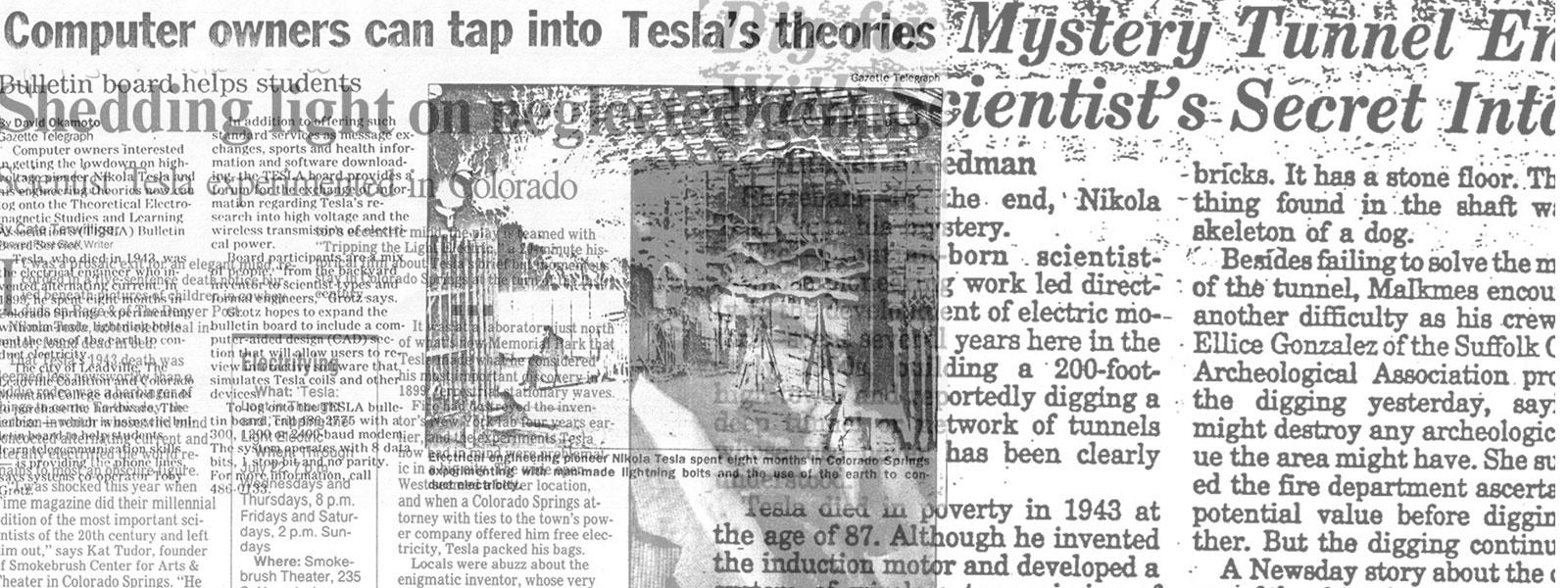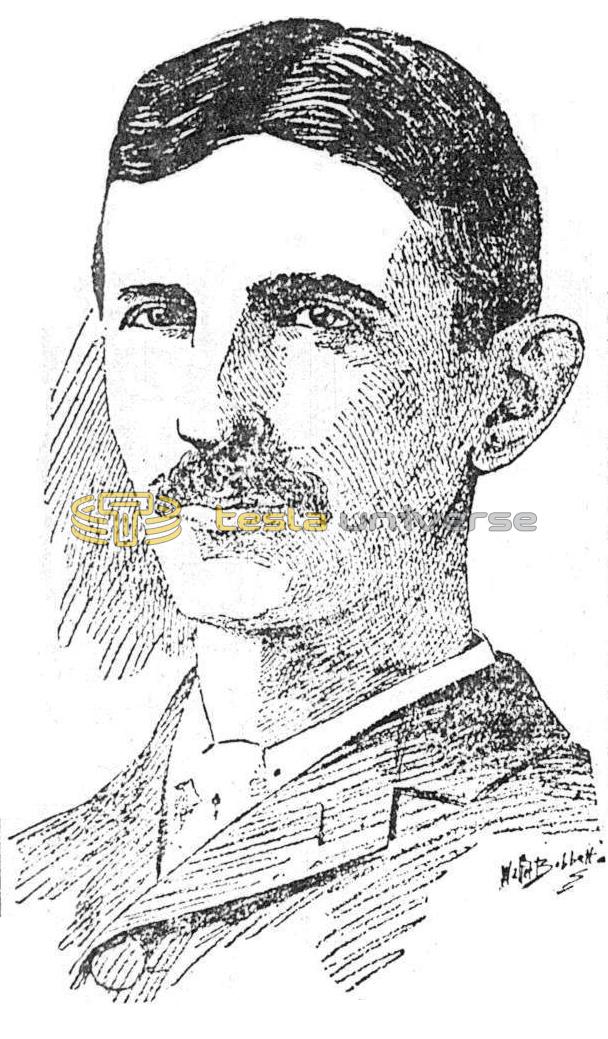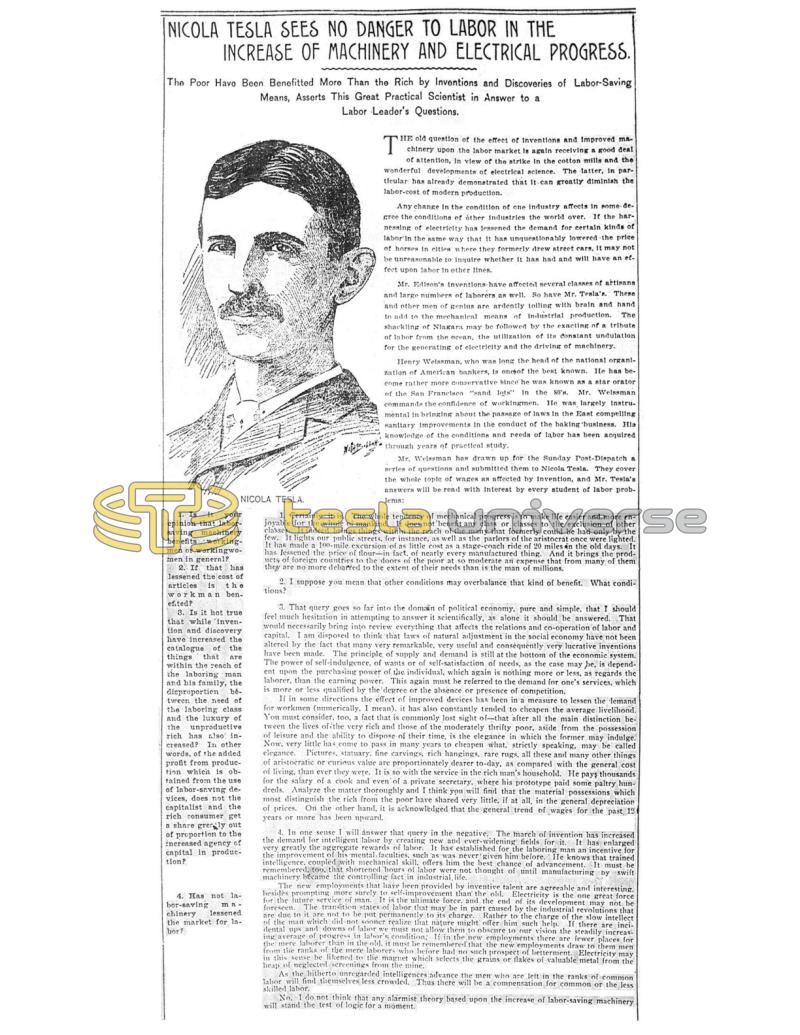
Nikola Tesla Articles
Nikola Tesla Sees No Danger to Labor in the Increase of Machinery and Electrical Progress
The Poor Have Been Benefitted More Than the Rich by Inventions and Discoveries of Labor-Saving Means, Asserts This Great Practical Scientist in Answer to a Labor Leader's Questions.
The old question of the effect of inventions and improved machinery upon the labor market is again receiving a good deal of attention, in view of the strike in the cotton mills and the wonderful developments of electrical science. The latter, in particular has already demonstrated that it can greatly diminish the labor-cost of modern production.
Any change in the condition of one industry affects in some degree the conditions of other industries the world over. If the harnessing of electricity has lessened the demand for certain kinds of labor in the same way that it has unquestionably lowered the price of horses in cities where they formerly drew street cars, it may not be unreasonable to inquire whether it has had and will have an effect feet upon labor in other lines.
Mr. Edison's inventions have affected several classes of artisans and large numbers of laborers as well. So have Mr. Tesla's. These and other men of genius are ardently toiling with brain and hand to add to the mechanical means of industrial production. The shackling of Niagara may be followed by the exacting of a tribute of labor from the ocean, the utilization of its constant undulation for the generating of electricity and the driving of machinery.
Henry Weissman, who was long the head of the national organization of American bankers, is one of the best known. He has become rather more conservative since he was known as a star orator of the San Francisco "sand lots" in the 80's. Mr. Weissman commands the confidence of workingmen. Ho was largely instrumental in bringing about the passage of laws in the East compelling sanitary improvements in the conduct of the baking business. His knowledge of the conditions and needs of labor has been acquired through years of practical study.
Mr. Weissman has drawn up for the Sunday Post-Dispatch a series of questions and submitted them to Nicola Tesla. They cover the whole topic of wages as affected by invention, and Mr. Tesla's answers will be read with interest by every student of labor problems:
1. Is it your opinion that labor-saving machinery benefits workingmen or workingwomen in general?
1. Certainly it is. The whole tendency of mechanical progress is to make life easier and more enjoyable for the whole of mankind. It does not benefit any class or classes to the exclusion of other classes. It indeed brings things within the reach of the many that formerly could be had only by the few. It lights our public streets, for instance, as well as the parlors of the aristocrat once were lighted. It has made a 100-mile excursion of as little cost as a stage-coach ride of 20 miles in the old days. It has lessened the price of flour - in fact, of nearly every manufactured thing. And it brings the products of foreign countries to the doors of the poor at so moderate an expense that from many of them they are no more debarred to the extent of their needs than is the man of millions.
2. If that has lessened the cost of articles is the workman benefited?
2. I suppose you mean that other conditions may overbalance that kind of benefit. What conditions?
3. Is it not true that while invention and discovery have increased the catalogue of the things that are within the reach of the laboring man and his family, the disproportion between the need of the laboring class and the luxury of the unproductive rich has also increased? In other words, of the added profit from production which is obtained from the use of labor-saving devices, does not the capitalist and the rich consumer get a share greatly out of proportion to the increased agency of capital in production?
3. That query goes so far into the domain of political economy, pure and simple, that I should feel much hesitation in attempting to answer it scientifically, as alone it should be answered. That would necessarily bring into review everything that affects the relations and co-operation of labor and capital. I am disposed to think that laws of natural adjustment in the social economy have not been altered by the fact that many very remarkable, very useful and consequently very lucrative inventions have been made. The principle of supply and demand is still at the bottom of the economic system. The power of self-indulgence, of wants or of self-satisfaction of needs, as the case may be, is dependent upon the purchasing power of the individual, which again is nothing more or less, as regards the laborer, than the earning power. This again must be referred to the demand for one's services, which is more or less qualified by the degree or the absence or presence of competition.
If in some directions the effect of improved devices has been in a measure to lessen the demand for workmen (numerically, I mean), it has also constantly tended to cheapen the average livelihood. You must consider, too, a fact that is commonly lost sight of - that after all the main distinction between the lives of the very rich and those of the moderately thrifty poor, aside from the possession of leisure and the ability to dispose of their time, is the elegance in which the former may indulge. Now, very little has come to pass in many years to cheapen what, strictly speaking, may be called elegance. Pictures, statuary, fine carvings, rich hangings, rare rugs, all these and many other things of aristocratic or curious value are proportionately dearer to-day, as compared with the general cost of living, than ever they were. It is so with the service in the rich man's household. He pays thousands for the salary of a cook and even of a private secretary, where his prototype paid some paltry hundreds. Analyze the matter thoroughly and I think you will find that the material possessions which most distinguish the rich from the poor have shared very little, if at all, in the general depreciation of prices. On the other hand, it is acknowledged that the general trend of wages for the past 12 years or more has been upward.
4. Has not labor-saving machinery lessened the market for labor?
4. In one sense I will answer that query in the negative. The march of invention has increased the demand for intelligent labor by creating new and ever-widening fields for it. It has enlarged very greatly the aggregate rewards of labor. It has established for the laboring man an incentive for the improvement of his mental faculties, such as was never given him before. He knows that trained intelligence, coupled with mechanical skill, offers him the best chance of advancement. It must be remembered, too, that shortened hours of labor were not thought of until manufacturing by swift machinery became the controlling fact in industrial life.
The new employments that have been provided by inventive talent are agreeable and interesting, besides prompting more surely to self-improvement than the old. Electricity is the one great force for the future service of man. It is the ultimate force, and the end of its development may not be foreseen. The transition states of labor that may be in part caused by the industrial revolutions that are due to it are not to be put permanently to its charge. Rather to the charge of the slow intellect of the man which did not sooner realize that nature might offer him such help. If there are incidental ups and downs of labor we must not allow them to obscure to our vision the steadily increasing average of progress in labor's condition. If in the new employments there are fewer places for the mere laborer than in the old, it must be remembered that the new employments draw to them men from the ranks of the mere laborers who before had no such prospect of betterment. Electricity may in this sense be likened to the magnet which selects the grains or flakes of valuable metal from the heap of neglected screenings from the mine.
As the hitherto unregarded intelligences advance the men who are left in the ranks of common labor will find themselves less crowded. Thus there will be a compensation for common or the less skilled labor.
No, I do not think that any alarmist theory based upon the increase of labor-saving machinery will stand the test of logic for a moment.

